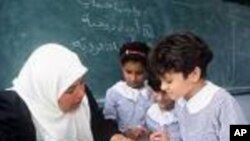School textbooks typically reflect what government leaders want children to believe. Nowhere is this issue more crucial than in the Middle East where political passions constitute a threat to world peace.
A United Nations Perspective
“There are two competing views of Middle East history that affect teachers and students alike,” said British journalist Ian Williams, who reports from the United Nations in New York.
Nowhere is that more obvious than in accounts of what happened in 1948. Israelis remember it as the year their state was established. Palestinians remember it as the naqba – or catastrophe – when 700,000 refugees were forced to flee.
The United Nations Relief and Works Agency, or UNRWA, has developed textbooks that explain the events after World War II. Williams explained how, in UNRWA schools, the Holocaust is discussed in the context of how it helped lead to the Universal Declaration of Human Rights of 1948. “Of course," he said, "They (UNRWA) immediately got into trouble with Hamas.”
“If you don’t want closed minds, school children need to know something about the other side’s views,” Williams said. He called it a “big step forward” when a few years ago the Education Ministry of Israel’s Kadima government decided to teach students about the circumstances that Palestinians faced in 1948. "Although Palestinians have reason to resent what was done to them by the Israelis," Williams suggested, "They need to understand that Israelis justify their subsequent political and military policy, based on their victimization by the Nazis."
“I think history proves that one of the most dangerous forces is politics is a heavily armed victim,” Williams observed. He reminded us that the people who have conducted many wars throughout history – from the Nazis in Central Europe to the Serbs in the former Yugoslavia and the Hutus in Rwanda – considered themselves as victims and justified their own crimes on that basis. “But one of the important things about a human rights curriculum is that it teaches you that you can be a victim, but that does not absolve you if you do the same to others,” Williams said.
An Israeli Perspective
Israeli Prime Minister Benjamin Netanyahu’s government recently banned the use of the word “naqba” in Arabic textbooks. But Israeli journalist Akiva Eldar, of Ha’aretz newspaper in Jerusalem, says he is frankly skeptical of the impact of textbooks changing the minds of young people.
“I don’t believe it’s possible to change minds while you’re still disputing territories or the future of four million refugees and while Israelis are occupying Palestinian and Syrian territory,” said Eldar. “You can’t expect children who have to cross checkpoints on their way to school to be impressed by textbooks that Israelis are the good guys.” Children, he notes, tend to perceive the world as divided between good guys and bad guys.
“At the same time, you can’t expect the Israelis, who are terrorized by their demonization in the Arab media, to look at the history of Palestinians and say, ‘They also have rights,'" said Eldar. "We have to understand what we see as our war of independence is their catastrophe.” Eldar said it’s not a question of blame. Rather, he said it’s just the way things are likely to remain so long as there is an occupation.
A Palestinian Perspective
"The obstacles are obvious, but nonetheless the problem still has to be addressed," said Nadia Bilbassy, senior correspondent with Middle East Broadcasting Center. “Israeli textbooks, just like Palestinian textbooks, ignore the other side completely,” she said. For Israelis, Bilbassy noted the events of 1948 are seen entirely from the perspective of what happened to the Jewish people during the Holocaust. “And they see Israel as their natural homeland,” she said.
But Bilbassy, who grew up in Gaza, said she is also the product of her homeland. “Until 1967, you had the Egyptian curriculum and the Jordanian curriculum, depending on whether you were from Gaza or the West Bank,” she explained. "Furthermore, the Israelis censored any recounting of Palestinian history," she added. “You learned about European history, Islamic history, and Ottoman history, but there was no mention of modern history and what happened to the Palestinian people.”
All that changed, Bilbassy said, after the Palestinian Authority took over. “Then, there was a complete blackout of what happened to the Jewish people during the Holocaust,” she said. She said she believes neither of these two approaches can provide a way out of the current impasse.
“To find a solution to the conflict, you need to make the other side aware of your suffering,” Bilbassy said. To her, that means examining textbooks and the school curriculum. “It’s really sad to see somebody like Iranian President Mahmoud Ahmadinejad, who regularly denies the Holocaust,” said Bilbassy. “But it’s equally sad to see Israelis ignore Palestinian suffering as the result of what happened to them when the state of Israel was established.”
To avoid that, Bilbassy said it's important to put oneself in another person’s historical shoes. “I think it’s always wrong to try to maximize suffering in terms of 'Our suffering is not the same as your suffering because ours is ten times worse than yours,'” she said.
“I can tell you from my own experience," said Bilbassy, "There was nothing I learned that makes me hate Jews because of their religion and ethnicity. You disagree with them because they are an occupying force – and that’s a question of politics, not history.”
What to Do?
In 1963, U.S. President John F. Kennedy noted in a speech before the United Nations the great difficulty psychological barriers pose to mutual understanding. “Peace depends not just on charters and covenants but on the hearts and minds of people.” If Kennedy was right, it means the attitudes taught by the state to its young people are critical. So, textbooks do matter.
Williams, Eldar, and Bilbassy appeared on the VOA English radio program International Press Club with host Judith Latham.




